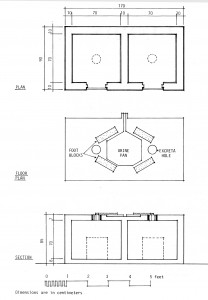And now for something completely different.
The Bill and Melinda Gates Foundation has turned its sights on a new global problem: sanitation. The foundation has committed $3 million to support research that has as its goal to “reinvent the toilet as a stand-alone unit without piped-in water, a sewer connection, or outside electricity—all for less than 5 cents a day.” “Reinvent the toilet” outré, but it isn’t. Children playing around a sparkling water pump are more photogenic than a well-functioning toilet, but inadequately treated human waste is the source of most water-transmitted diseases. And since running water supply is in short supply in third world countries, never mind adequate sewage treatment, the conventional flush toilet is not an option—a waterless toilet makes sense.
I don’t know what the Gates project will come up with, but I would be surprised if composting wasn’t a part of the solution. A typical adult excretes about half a pound of feces daily and between one and two quarts of urine, and since composting requires dry conditions, getting rid of the liquid is a problem. Most composting toilets use some combination of heat and induced ventilation.
An ingenious composting toilet, the Gopuri, designed by Appasheb Patwardan in India in the 1940s, takes advantage of a special characteristic of human excreta: feces transmit pathogens, but urine is sterile. The Gopuri separates solid and liquid waste, which occurs naturally in a squatting position. A handful of ashes is sprinkled over the waste after each use. The toilet consists of two vaults. When one is full, it is sealed up, and the adjoining vault is emptied and put into use. The contents decompose anaerobically; the holding period is typically 3-6 months. The urine is disposed of immediately; the compost is used in agriculture. Thousands of Gopuri toilets were installed in the state of Maharashtra. A version of the Gopuri is reported to have been used with success in North Vietnam in the 1960s. There have been demonstration projects in a number of countries.
Stop the Five Gallon Flush, the classic 1973 guide from McGill University’s Minimum Cost Housing Group, featured in the Whole Earth Catalog, describes 80 alternative sanitation systems, including the Gopuri, and is available free online.



